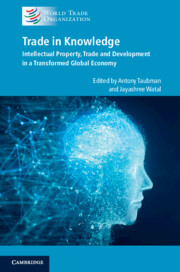Book contents
- Frontmatter
- Contents
- Figures
- Tables
- Contributors
- Preface
- 1 Thematic Overview: Charting the Evolution of Knowledge Flows
- Part I Conceptual Framework
- Part II Measuring Trade in Knowledge
- Part III Impact of Knowledge Flows on Trade and Development
- Part IV Policy, Regulatory and Legislative Frameworks
- Part V Looking Forward
- Index
21 - Trade in Knowledge and Cross-Border Data Flows: A Look at Emerging Digital Regulatory Issues
from Part IV - Policy, Regulatory and Legislative Frameworks
Published online by Cambridge University Press: 17 February 2022
- Frontmatter
- Contents
- Figures
- Tables
- Contributors
- Preface
- 1 Thematic Overview: Charting the Evolution of Knowledge Flows
- Part I Conceptual Framework
- Part II Measuring Trade in Knowledge
- Part III Impact of Knowledge Flows on Trade and Development
- Part IV Policy, Regulatory and Legislative Frameworks
- Part V Looking Forward
- Index
Summary
In contrast to the international trade issues around the movement of goods that defined 20th century globalization, trade in the 21st century is increasingly digital and knowledge-based, in large part, as digital technologies enable data-driven innovation, the ongoing disaggregation of production, and the increasing trade in services. Modern trade is more about the movement of bytes, ideas, information, and services, which are subject to a variety of non-tariff policies that affect digital and digitally enabled trade. However, the ever-growing gap between technological innovation and domestic and international policy frameworks shows that many policymakers are struggling to adapt rules and norms to today’s digital economy, which detracts from the potential economic and social benefits of these technologies. In the years ahead, policymakers will face a key choice in deciding whether they want to be bold and adjust policies in order to embrace a truly global market for digitally enabled trade in goods and services.
Information
- Type
- Chapter
- Information
- Trade in KnowledgeIntellectual Property, Trade and Development in a Transformed Global Economy, pp. 623 - 648Publisher: Cambridge University PressPrint publication year: 2022
